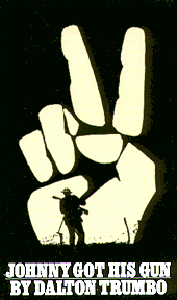JOHNNY GOT HIS GUN
 I’m assuming, with reluctance but increasing certainty that the majority of us will never find ourselves as a quadruple amputee, blind, deaf and mute. I too am assuming that Dalton Trumbo found those odds to be quite obvious when he wrote Johnny Got His Gun. Trumbo was a member of the Communist party from 1943 to 1948, consequently during the McCarthy era Trumbo was blacklisted and Johnny Got His Gun was pulled from the shelves, and eventually pulled from printing presses all together. World War I was a war that was to be filled with valor and glory. It was fought to make the world safe for democracy. But no one had the premonition to see the millions of ruined lives and dead soldiers that reattributed the valor and glory. Joe Bonham found himself “over there, over there” during the Great War, but he never came home. Johnny Got His Gun, adhering to the post-modernistic way, is an anachronistic view of Joe Bonham’s life and the years following his wounds suffered in the war. And by wounds I mean a quadruple amputee, blind, deaf, and mute. Sounds horrific right? Well in a way it is. In reality, however, it is a beautiful opus regarding the brutalities of war, and the after-effects. Unlike Erich Maria Remarque’s All Quiet on the Western Front, Johnny Got His Gun is not a depiction, or rather a narration, of war. It is an opportunity for the dead to speak, and the living to be warned.
I’m assuming, with reluctance but increasing certainty that the majority of us will never find ourselves as a quadruple amputee, blind, deaf and mute. I too am assuming that Dalton Trumbo found those odds to be quite obvious when he wrote Johnny Got His Gun. Trumbo was a member of the Communist party from 1943 to 1948, consequently during the McCarthy era Trumbo was blacklisted and Johnny Got His Gun was pulled from the shelves, and eventually pulled from printing presses all together. World War I was a war that was to be filled with valor and glory. It was fought to make the world safe for democracy. But no one had the premonition to see the millions of ruined lives and dead soldiers that reattributed the valor and glory. Joe Bonham found himself “over there, over there” during the Great War, but he never came home. Johnny Got His Gun, adhering to the post-modernistic way, is an anachronistic view of Joe Bonham’s life and the years following his wounds suffered in the war. And by wounds I mean a quadruple amputee, blind, deaf, and mute. Sounds horrific right? Well in a way it is. In reality, however, it is a beautiful opus regarding the brutalities of war, and the after-effects. Unlike Erich Maria Remarque’s All Quiet on the Western Front, Johnny Got His Gun is not a depiction, or rather a narration, of war. It is an opportunity for the dead to speak, and the living to be warned.
The book takes place in the confines of Joe Bonham’s mind, in some infirmary, in some country, at some juncture in time proceeding World War I. Without the ability to speak, gesture, or even hear, Joe Bonham is forced to divide consciousness from sleep, dreams from reality, and lightness from dark. The only equilibrium offered to him, is a daily visit from a nurse, other than that he lives in complete nothingness. The reader is offered a look into Joe Bonham’s past, and most notably the horrors that he witnessed during the war.
This book, most notably though, deals with pacifism and the rights of dead soldiers. This book has been hailed by some as the best anti-war book ever written, this notion is easily seen in Joe Bonham’s reveries of the war, and then his increasing fury at being amongst the dead, even though he was still living. Trumbo closes out each of the two sections in the book with rather long and drawn out harangues regarding the futility of war and so called “noble deaths.” In the closing of the first section of the book Trumbo writes, “So the words about noble deaths and sacred blood and honor and such are all put into dead lips by grave robbers and fakes who have no right to speak for the dead.”
The rest of the book follows in a similar pattern, growing in intensity and passion. With the exclusion of commas throughout the entire book, it often times gets a little muddy, but with some prudence that glitch is easy to look over.
This book has somewhat of a “blank stare” ending. I found myself sitting and thinking about what I had just read, and being horrified, but at the same time fulfilled. It is perhaps, the most horrific view of war I have ever read, and it takes place not on a battlefield but in a bed. Buy some time for this book. Happy reading.
- What To Know About Mosquito Season - July 19, 2024
- Local Worship & Events: July 19 Update - July 19, 2024
- Allen County Bar Foundation Announces Scholarship Winners - July 19, 2024


